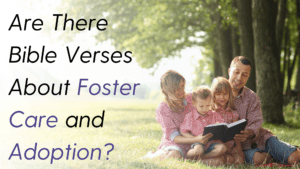I came out of my bedroom, and she was looking out the front door. Her little shorts were on inside out. She was wearing a stained t-shirt that she had pulled from the dirty laundry pile. Her feet were crammed into sandals that belonged to her younger sibling. If she weren’t so serious looking, I might have snapped a picture of her preschool independence. I walked over and sat quietly behind her on the stairs with my coffee. I waited in the silence of the morning until she turned with a breathless smile and said, “Today, I see my mommy.” I smiled back and nodded. My foster parent heart winged a quick prayer that her biological mother would show up. I reached for her hand and told her that she still had several hours to wait. I suggested we eat breakfast and brush her hair.
That day, and many after, she would quickly return to the door to wait for her mom. She would wait with nervous anticipation for a mom who often didn’t show up for her three children (aged two months, eighteen months, and four years). Then I would be the one to tell her that mommy couldn’t make it today and that she got very busy and was so sorry. And this baby girl would look at me with anger-filled tears because this was my fault.
Over and over, I took on the disappointment of a four-year-old waiting for a mother who forgot to get out of bed.
Shared Parenting in Foster Care

During my husband’s and my foster care classes, we learned that the goal of foster parenting is reunification with birth parents while minimizing the trauma for children. One way to achieve this goal is through a practice called shared parenting. This type of parenting is when two or more adults work together to raise a child even though they are not living together or related. My husband and I shared parenting with the biological mom. This sounds good when taught in a classroom, but it is so much harder when a little girl is standing at my front door in tears.
Tuesday was a visit day, and I found myself once again fuming in righteous foster parent anger. I was mad because the visit consisted of candy, Cheetos, and the wrong infant formula. Their mother had not changed any diapers, and the children had returned home soiled and crying. My heart struggled. Every single visit, the 18-month-old vomited on the way to the visit and all the way home. His body was so stressed that he would get violently sick in the transport car. The four-year-old would wet her pants because, in her excitement to see her mother, she wouldn’t remember to go to the bathroom in time. I grumbled under my breath as I handled the stress-induced vomit, the orange fingerprints, the urine-soaked shorts, and the overwhelming toddler emotions. Mom had actually shown up this time, and while I felt relief that the visit happened, I still felt resentful.
Shared parenting with this mom didn’t feel equal or fair. Instead, I felt like I was the punching bag for all things emotional. I was the one left to pick up the pieces and put them back together. I was the one scrubbing the orange Cheeto dust.
Lessons From an Inmate
Later that same day, I sat in a concrete, windowless room with 14 incarcerated women. I remember I cleaned spit-up from my shirt in the jail parking lot. I looked more than a little disheveled. It had been an overwhelming day, and the three children in my care were finally settled with foster dad while I went to work. I stepped into the cellblock that day, ready to “teach” my frustrations and see change. I was prepared to help these women choose their children and make better choices. As often happens when I teach, I instead learned a life lesson from one of the students. During circle group time, one of the women spoke a hard truth. It cut me to the core as a foster parent.
She sat across from me in her orange jumpsuit and rubber sandals with a trail of tattoos up her arms. “You want to know my hardest thing,” she whispered as tears brimmed her eyelids. The rest of the women were pin-drop silent.
“The hardest thing to ever do is to look at your kids and see that someone else can do it better than you. To look at them with another woman and realize that she is a better mom and can give them better than you.”
She looked up at me, raw and broken through her tears. “And so I gave my children better, but now I’m afraid they won’t know how desperately I loved them. I loved them enough to give them… her.”
When Love Triumphs Over Generational Trauma
Suddenly the Cheetos, the candy, and the diapers felt insignificant. At that moment, I sat in the hard truth of foster care and adoption. Oftentimes loss, fear, and brokenness are the only things shared or equal. I saw the hurt through the eyes of a mother attending a visit who gave her child the Cheetos because she asked for them. She wanted to say “yes” to the requests because the “no”s she had already given them were so very big.
I sat in my car that day and cried. For the first time, I saw past the four-year-old standing at the front door. I could see the biological mother lying on her couch in a rundown building. She gathers the courage to be what she believes she could never be. She pulls the covers over her head and ignores the phone ringing beside her. I understood in my heart that trauma and abuse are generational; we often parent how we were parented. And I wondered about the similarities between the little girl waiting to be seen and her 28-year-old mother: the young mother who has three tiny babies and has realized that her love alone is not enough. She cannot be what they need, so she gives them… a foster parent. It’s not fair, but it is shared parenting.
In the world of foster care – where there is so much trauma and addiction – fairness is found in carrying the hurt. Each heavy portion is lifted off a child’s shoulders and spread amongst the “shared parents.” This is the goal of foster care: stepping alongside the hurting and taking a heap of the hurt.
It’s the hard truth, but it makes the vomit, disappointment, and dusty orange fingers seem fairer.




















